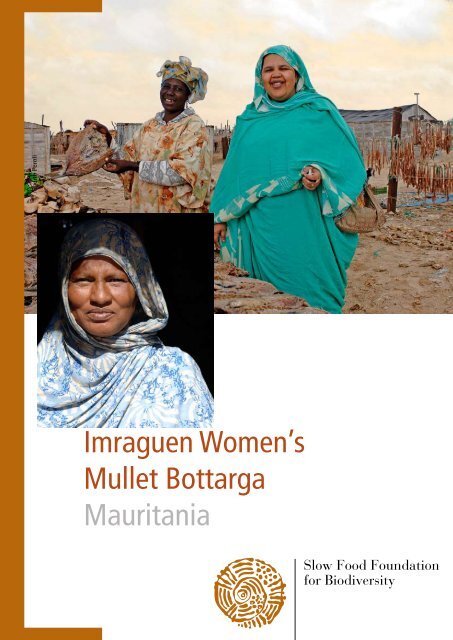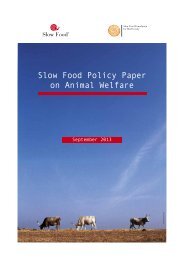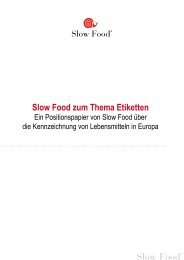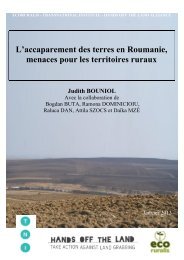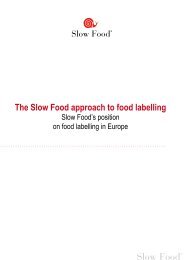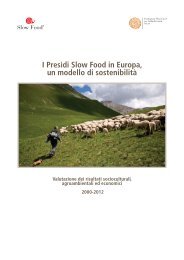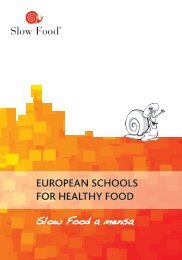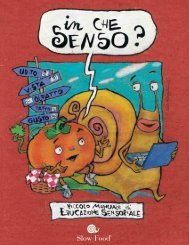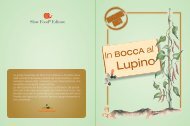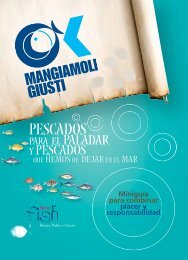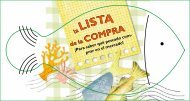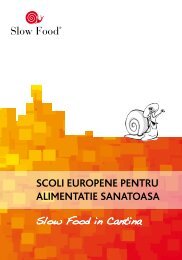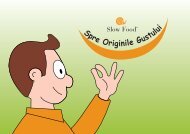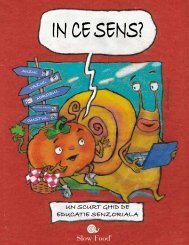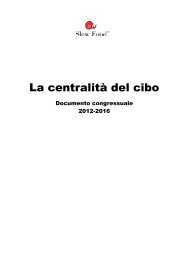Imraguen Women's Mullet Bottarga Mauritania - Slow Food
Imraguen Women's Mullet Bottarga Mauritania - Slow Food
Imraguen Women's Mullet Bottarga Mauritania - Slow Food
Create successful ePaper yourself
Turn your PDF publications into a flip-book with our unique Google optimized e-Paper software.
© Alberto Peroli<br />
<strong>Imraguen</strong> Women’s<br />
<strong>Mullet</strong> <strong>Bottarga</strong><br />
<strong>Mauritania</strong>
<strong>Slow</strong> <strong>Food</strong> Presidia are local projects that work to improve the<br />
infrastructure of artisan food production. The goal of the Presidia is to guarantee a viable future<br />
for traditional foods by stabilizing production techniques, establishing stringent production<br />
standards, and promoting local consumption. The Presidia project is coordinated by the <strong>Slow</strong> <strong>Food</strong><br />
Foundation for Biodiversity, which organizes and funds projects that defend our world’s heritage<br />
of agricultural biodiversity and gastronomic traditions.
The traditional extraction of the bottarga from the mullet along the coast<br />
of <strong>Mauritania</strong>. The work is done on the ground with limited concern<br />
for hygiene and safety.<br />
The place:<br />
The Islamic Republic of <strong>Mauritania</strong> is an area, predominantly desert,<br />
of over one million square kilometers with 700 kilometers of coast.<br />
Along this coast, in the North, is the famous Banc d’Arguin, made a<br />
National Park in 1976 to safeguard the natural environment and extraordinary<br />
marine and lagoon. The nearest large city is Nouadhibou,<br />
the principle port of <strong>Mauritania</strong>.<br />
Production area:<br />
Villages along the Arguin Bank and Nouadhibou<br />
The Presidium<br />
The survival of the <strong>Imraguen</strong> is bound up with mullet fishing: mullet<br />
is a staple food in the fishing community’s diet and their villages on<br />
the beach are moved according to fish movements. The presidium<br />
is based on a cooperative of <strong>Imraguen</strong> women - assisted by a local<br />
NGO, Mauritanie 2000 - who live in Nouadhibou, the second largest<br />
city in <strong>Mauritania</strong>. The Presidium producers buy mullet from the fishermen<br />
and transform it.<br />
The protagonists:<br />
- The <strong>Imraguen</strong> are an ethnic group predominantly dedicated to fishing<br />
and transforming the fish that live all along the coast of Mautritania.<br />
Their presence in the area predates the large Arab migration<br />
from Maghreb that began in the 11th century.<br />
- 2 Cooperatives, composed of about 30 <strong>Imraguen</strong> women from the<br />
Nouadhibou area and the Banc d’Arguin, produce the fish products<br />
and, in particular, they produce bottarga with the eggs of the red<br />
mullet. The women of the Cooperatives are the nucleus of the Presidium.
The bottarga for personal consumption and for the local<br />
market is dried under the sun in the open air on boards and<br />
tables set on the sheet metal roofs of their houses<br />
The local salt is not suitable for a quality production<br />
Furthermore, the traditional production uses a minimum<br />
amount of salt, risking bacterial contamination<br />
- The NGO Mauritanie2000, begun in 1994, is the Presidium’s local<br />
partner, given the common interests and activities between their<br />
own program (“Femmes et Peche”) and <strong>Slow</strong> <strong>Food</strong>’s project.<br />
- The Orbetello Lagoon Fish Cooperative, a <strong>Slow</strong> <strong>Food</strong> Tuscan Presidium,<br />
is the Presidium’s technical partner.<br />
- The <strong>Slow</strong> <strong>Food</strong> Foundation for Biodiversity plans and follows the<br />
various phases of development of the Presidium.<br />
The stages of the project<br />
2006<br />
An informal first contact was made in 2005, but it was during a<br />
visit by a <strong>Slow</strong> <strong>Food</strong> delegation February 9-15, 2006 that a deeper<br />
relationship was established with the NGO <strong>Mauritania</strong>2000 representatives<br />
Nedwa Oumoulbenine of Nouakchott and Marième Mint<br />
Dahoud of Nouadhibou. Through the NGO, the <strong>Slow</strong> <strong>Food</strong> experts<br />
came to know the social and economic situation of the local population<br />
as well as the responsibilities of the National Park and they<br />
began working with the women of the SAVA Cooperative.<br />
Those who participated in this first trip: Raffaella Ponzio and Séverine<br />
Petit (<strong>Slow</strong> <strong>Food</strong> Foundation), Massimo Bernacchini and Massimo<br />
Paoletti (Orbetello Lagoon Fish Cooperative) and the photographer<br />
Alberto Peroli (technical partner of the <strong>Slow</strong> <strong>Food</strong> Foundation).<br />
From October 11 – 26, 2006 the Orbetello Cooperative hosted a<br />
group of women from the NGO Mautitanie2000 and one of the Cooperatives<br />
at Orbetello. During their stay in Tuscany, the women<br />
visited the Cooperative’s production workshop and learned the techniques<br />
to produce bottarga. There, also, the women produced the<br />
bottarga that would be sold at Salone del Gusto, using raw material<br />
brought from <strong>Mauritania</strong>. Augusto Cattaneo, food technologist and<br />
project consultant, gave a technical course to the three <strong>Mauritania</strong>n
Massimo Paoletti (Lagoon Fish Coop.) demonstrates the<br />
technique used at Orbetello to extract the delicate bottarga<br />
without damaging them<br />
The bottarga drying on wooden planks<br />
guests in Orbetello.<br />
From October 26 – 30, 2006, in Turin, two of the principal events<br />
organized by <strong>Slow</strong> <strong>Food</strong> were held simultaneously: Salone del Gusto,<br />
a world exhibition and market of quality food, and Terra Madre, a<br />
world meeting of food communities which together saw the participation<br />
of some 9000 producers, researchers, cooks and others<br />
united in daily contact with the issues related to agriculture, fishing,<br />
breeding, the environment and biodiversity all over the world.<br />
At Salone del Gusto the representatives from one of the Cooperatives<br />
and the NGO Mauritanie2000 introduced the bottarga that they<br />
produced during their training in Orbetello, selling the entire production,<br />
40 kg, for a price of 120 euro/kg. The proceeds have been used<br />
to fund the activities of the Presidium and to improve the facilities<br />
and the training of the women.<br />
From December 14 – 20, 2006 a new trip to <strong>Mauritania</strong> was organized<br />
to provide follow-up and to reinforce, locally, the previous experiences<br />
and the relationships that had been established. Massimo<br />
Paoletti and Augusto Cattaneo, accompanied by Simone Beccaria<br />
(<strong>Slow</strong> <strong>Food</strong> Foundation), worked in close collaboration with Marième<br />
Mint Dahoud from Mauritanie2000 and the women from the<br />
Cooperative, who in the meantime had identified and rented a new<br />
production workshop that is more spacious, sanitary and equipped<br />
with electricity and running water. During the visit the main activities<br />
concentrated on the possibility to carry out the entire bottarga production<br />
locally: from obtaining the fish to the extraction, the salting,<br />
the drying and the preservation.<br />
The label of the bottarga sold at Salone del Gusto
The Cooperative rented a new production workshop that is<br />
more spacious, wired for electricity and easily connected to<br />
running water. The workshop is made up of three painted<br />
rooms with cement floors<br />
and a sandy courtyard.<br />
2007<br />
For <strong>Slow</strong> Fish (an event dedicated to sustainable fishing that was<br />
held in Genoa May 4 – 7, 2007) the bottarga production/training<br />
took place temporarily in an artisan workshop, equipped with refrigeration,<br />
air conditioning, fresh and salt water, clean rooms, and<br />
aluminum and Teflon counters, located in front of the port of Nouadhibou.<br />
This workshop is equipped to meet the EU sanitary regulations<br />
and is the best solution for a quality production while waiting<br />
for the Presidium’s own workshop to be outfitted so that it meets<br />
the regulations to be able to export to European countries.<br />
The fish purchased at the artisan fishing port of Nouadhibou.<br />
The unit of measure is the “Peugeot”, which<br />
contains about a ton of fish.
The Cooperative has been equipped with hairnets and aprons in<br />
order to work in a hygienic manner;<br />
on the occasion of the visit to <strong>Mauritania</strong> a supply of latex<br />
gloves was also provided
The extraction of the bottarga is reproduced as close<br />
as possible to the process followed in Orbetello<br />
and demonstrated by Massimo Paoletti, working<br />
hygienically,<br />
quickly and delicately<br />
The fish are cleaned, to limit the damage caused by transportation<br />
from the boats, trucks<br />
and containers to the workshop
At the end of the salting stage, the bottarga are<br />
washed under fresh running water<br />
A greater amount of salt is now being used. The production uses<br />
a large grain salt from Spain, imported by a local fish producer
Between activities, four frames were constructed for the drying process, using mosquito netting<br />
brought from Italy and the artistry of a local carpenter
The drying takes place in one of the rooms of the new workshop,<br />
which has been sanitized and equipped<br />
with a fan to circulate the air<br />
The small local fish restaurants, which sometime produce small<br />
quantities of bottarga,<br />
can be involved in the project, offering their customers<br />
a quality product<br />
Once dried, the bottarga is vacuum-packed using a small domestic<br />
machine<br />
Through the founders of Mauritanie2000 who participated in the work,<br />
the proper techniques can be<br />
shared with other cooperative.
Activities Planned for 2009<br />
- Buy land for the construction of a workshop equipped to house the entire production cycle,<br />
to obtain a quality bottarga<br />
- Equip the workshop with suitable instruments, buying and sending them to the production site<br />
- Train a fishermen group and collaborate with them in the project. Currently only women producers are<br />
involved and it is necessary to control the entire fish production chain<br />
- Completing the training of new producers to create a stable and continuing work group<br />
- Develop the production of a local salt so that there is a sufficient supply that is economical and com-<br />
pletes the local production chain. Spanish salt is used currently<br />
- Assist the women to participate in national and international events to promote the product<br />
- Produce communication materials in various languages, like photo-stories and dépliants<br />
- Provide the producers with technical support through visits to the production site<br />
The total amount required to realize these activities is 90,000 euros:<br />
Purchase of the land, workshop, equipment 60,000<br />
Training and consultancy 20,000<br />
National and International promotion events 5,000<br />
Communication 5,000<br />
The necessary funding being sought is 64,000 euros,<br />
according to the following breakdown:<br />
Purchase of land, workshop, equipment 47,000<br />
Training and consultancy 10,000<br />
National and International promotion events 5,000<br />
Communication 3,000<br />
Presidium Coordinator<br />
Nedwa Moctar Nech<br />
Mauritanie 2000 NGO<br />
tel. + 222 6306973<br />
ongmauritanie2000@mauritel.mr
The Presidium is supported by<br />
Technical Partners<br />
Orbetello Pesca Lagunare<br />
Editorial team<br />
Serena Milano, Chiara Frascari<br />
Photographs<br />
© Alberto Peroli<br />
Graphics<br />
Claudia Saglietti


